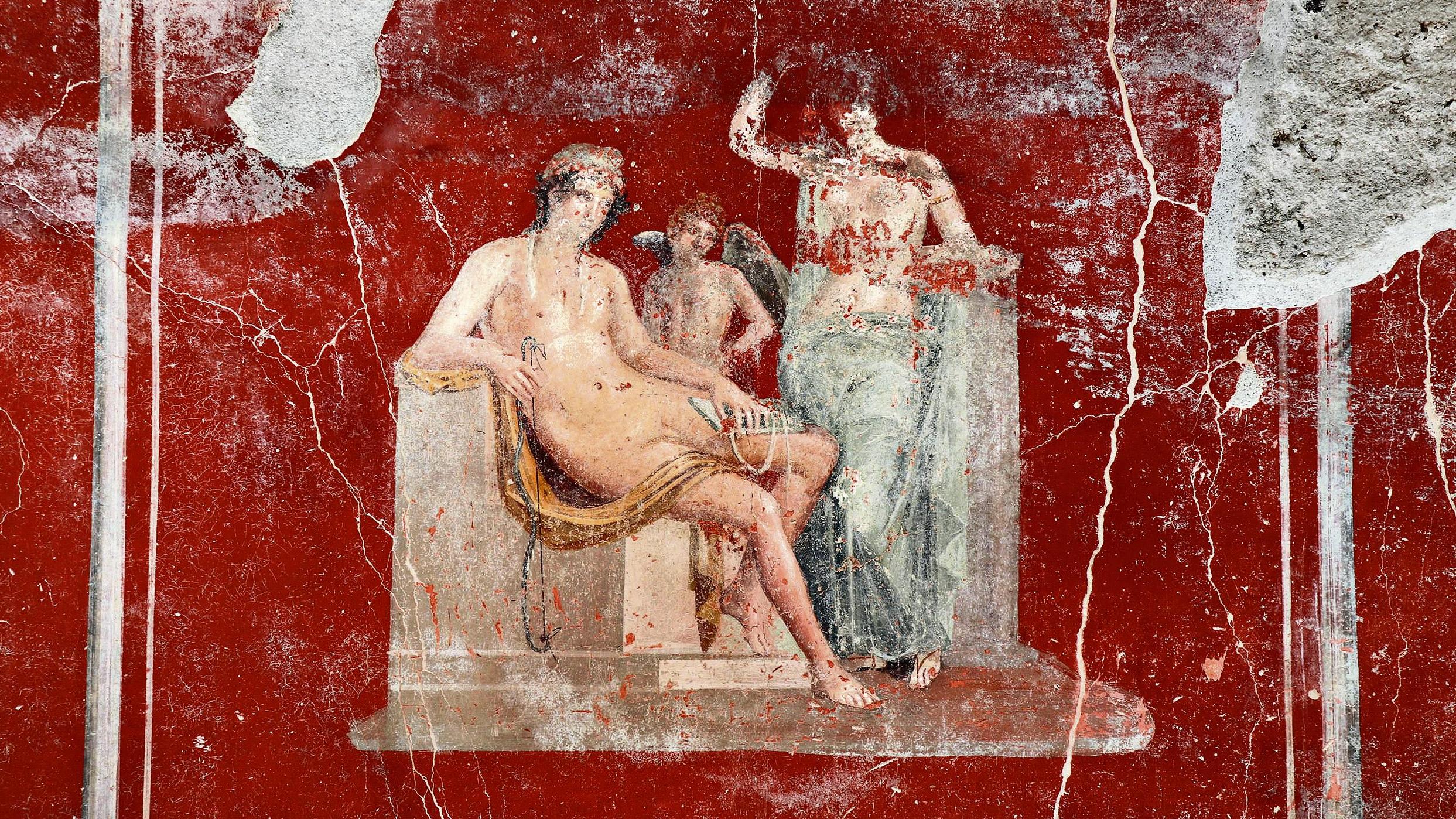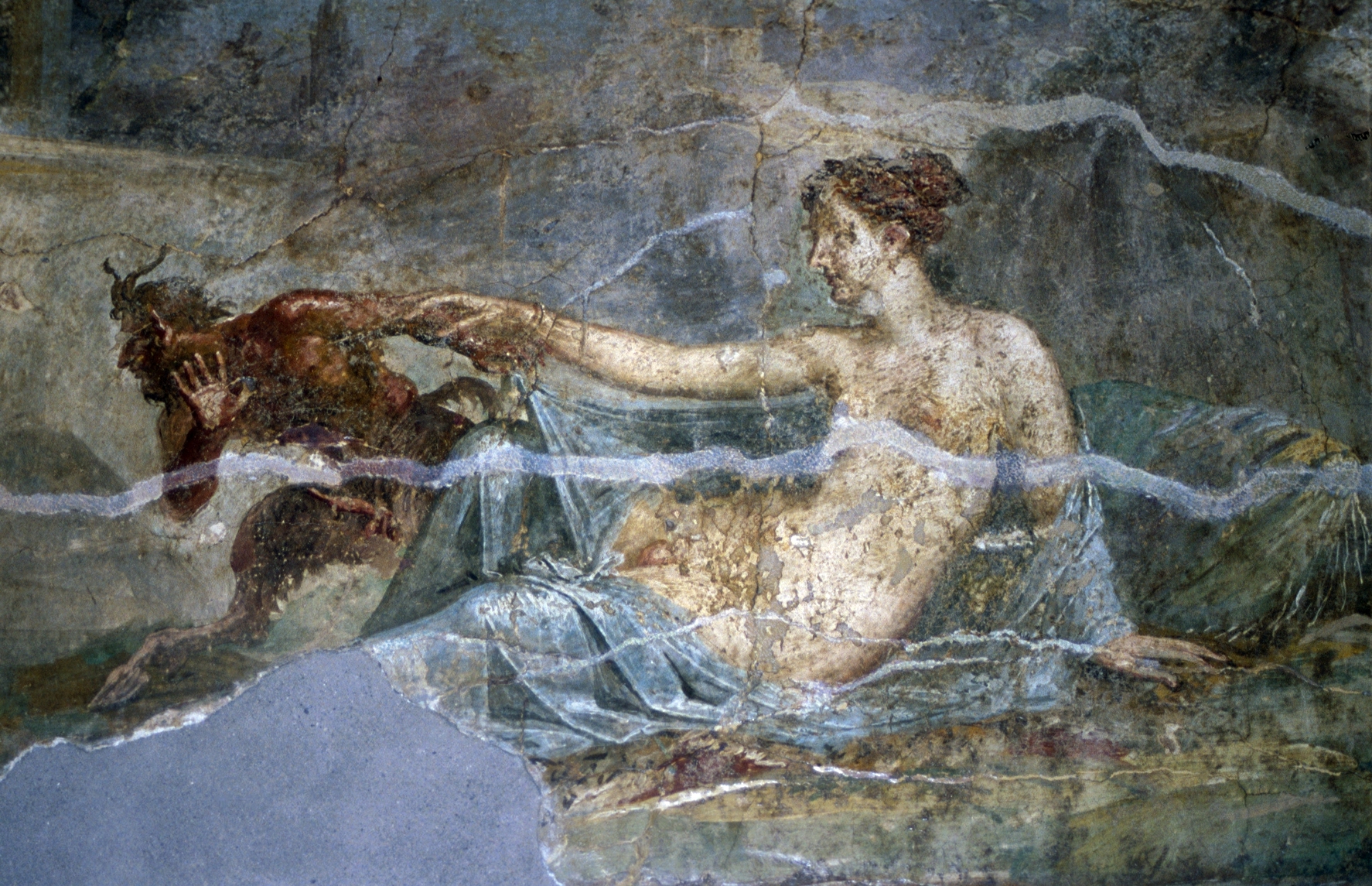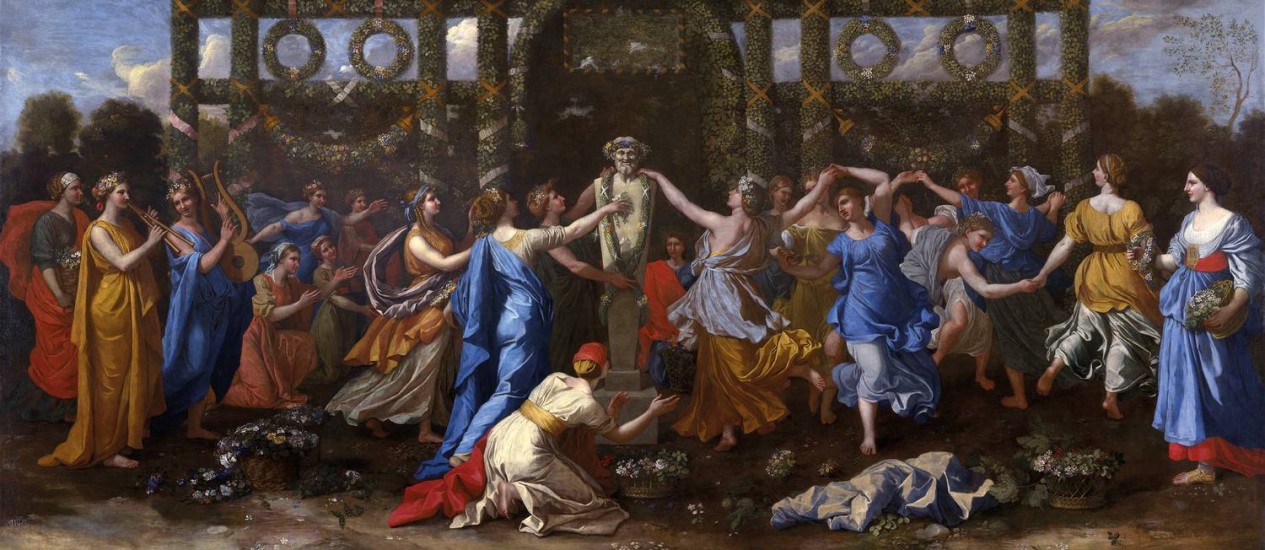|
Araros
Araros ( grc, Ἀραρώς), son of Aristophanes, born in 387 BCE, was an Athenian comic poet of the Middle Comedy. His brothers Philippus and Nicostratus were also comic poets. Aristophanes first introduced him to public notice as the principal actor (hypocrites) in his play ''Plutus'' (388 BCE), the last comedy which he exhibited in his own name. Aristophanes wrote two more comedies, ''Cocalus'' and ''Aeolosikon'', which were brought out in the name of Araros, probably very soon after the above date. Araros first exhibited in his own name in 375. Suidas mentions the following as his comedies: *''Adonis'' (erotic subject) *''Kaineus'', after the mythic transgender Caeneus (erotic subject) *''Kampylion'', a name of a fragmentary comedy by Eubulus, as well. *''Panos Gonai'', "Birth of Pan" *''Parthenidion'', "Small Virgin" (possible erotic subject, as well) *''Hymenaios'', a description of a wedding All that we know of Araros' dramatic character is contained in the following pass ... [...More Info...] [...Related Items...] OR: [Wikipedia] [Google] [Baidu] |
Aristophanes
Aristophanes (; grc, Ἀριστοφάνης, ; c. 446 – c. 386 BC), son of Philippus, of the deme In Ancient Greece, a deme or ( grc, δῆμος, plural: demoi, δημοι) was a suburb or a subdivision of Athens and other city-states. Demes as simple subdivisions of land in the countryside seem to have existed in the 6th century BC and ear ... Kydathenaion ( la, Cydathenaeum), was a comedy, comic playwright or comedy-writer of Classical Athens, ancient Athens and a poet of Ancient Greek comedy, Old Attic Comedy. Eleven of his forty plays survive virtually complete. These provide the most valuable examples of a genre of comic drama known as Ancient Greek comedy, Old Comedy and are used to define it, along with fragments from dozens of lost plays by Aristophanes and his contemporaries. Also known as "The Father of Comedy" and "the Prince of Ancient Comedy", Aristophanes has been said to recreate the life of ancient Athens more convincingly than any other author. His pow ... [...More Info...] [...Related Items...] OR: [Wikipedia] [Google] [Baidu] |
Middle Comedy
Ancient Greek comedy was one of the final three principal dramatic forms in the theatre of classical Greece (the others being tragedy and the satyr play). Athenian comedy is conventionally divided into three periods: Old Comedy, Middle Comedy, and New Comedy. Old Comedy survives today largely in the form of the eleven surviving plays of Aristophanes; Middle Comedy is largely lost, i.e. preserved only in relatively short fragments by authors such as Athenaeus of Naucratis; and New Comedy is known primarily from the substantial papyrus fragments of Menander. The philosopher Aristotle wrote in his '' Poetics'' (c. 335 BC) that comedy is a representation of laughable people and involves some kind of blunder or ugliness which does not cause pain or disaster. C. A. Trypanis wrote that comedy is the last of the great species of poetry Greece gave to the world. Periods The Alexandrine grammarians, and most likely Aristophanes of Byzantium in particular, seem to have been the first ... [...More Info...] [...Related Items...] OR: [Wikipedia] [Google] [Baidu] |
Nicostratus (comic Poet)
Nicostratus (Νικόστρατος) was a Greek playwright of the Middle Comedy. He was said to be the youngest son of Aristophanes. Photius I of Constantinople, Photius claims that Nicostratus leaped from the Leucadian Rock due to an unrequited love for a woman named Tettigidaea ( grc, Τεττιγιδαία) from Myrrinous and was "cured" of his love.Photius, Cod, 190, p. 153, ed. Bekk. Surviving titles and fragments The following twenty three titles, along with associated fragments, are all that survive of Nicostratus' work: * ''Favorite Slave'' * ''Female Love-Rival'' * ''Antyllus'' * ''Man Being Driven Away'' * ''Kings'' * ''The Accuser'' * ''Hecate'' * ''Hesiod'' * ''The Hierophant'' * ''The Bed'' * ''Laconians'' * ''The Cook'' * ''Oenopion'' * ''The Bird-Catcher'' * ''Pandarus'' * ''Pandrosus'' * ''Woman Swimming Alongside'' * ''Citizens'' * ''Wealth'' * ''The Syrian'' * ''The Moneylender'' * ''The Falsely-Branded'' * ''The Bustard-Bird'' References {{authority con ... [...More Info...] [...Related Items...] OR: [Wikipedia] [Google] [Baidu] |
Hypocrites
Hypocrisy is the practice of engaging in the same behavior or activity for which one criticizes another or the practice of claiming to have moral standards or beliefs to which one's own behavior does not conform. In moral psychology, it is the failure to follow one's own expressed moral rules and principles. According to British political philosopher David Runciman, "Other kinds of hypocritical deception include claims to knowledge that one lacks, claims to a consistency that one cannot sustain, claims to a loyalty that one does not possess, claims to an identity that one does not hold". American political journalist Michael Gerson says that political hypocrisy is "the conscious use of a mask to fool the public and gain political benefit". Hypocrisy has been a subject of folk wisdom and wisdom literature from the beginnings of human history. Increasingly, since the 1980s, it has also become central to studies in behavioral economics, cognitive science, cultural psychology, de ... [...More Info...] [...Related Items...] OR: [Wikipedia] [Google] [Baidu] |
Plutus (play)
''Plutus'' ( grc, Πλοῦτος, ''Ploutos'', "Wealth") is an Ancient Greek comedy by the playwright Aristophanes, which was first produced in 388 BCE. A political satire on contemporary Athens, it features the personified god of wealth Plutus. Reflecting the development of Old Comedy towards New Comedy, it uses such familiar character types as the stupid master and the insubordinate slave to attack the morals of the time. Plot The play features an elderly Athenian citizen, Chremylos, and his slave Cario or Carion. Chremylos presents himself and his family as virtuous but poor, and has accordingly gone to seek advice from an oracle. The play begins as he returns to Athens from Delphi, having been instructed by Apollo to follow the first man he meets and persuade him to come home with him. That man turns out to be the god Plutus — who is, contrary to all expectations, a blind beggar. After much argument, Plutus is convinced to enter Chremylos's house, where he will have his ... [...More Info...] [...Related Items...] OR: [Wikipedia] [Google] [Baidu] |
Suda
The ''Suda'' or ''Souda'' (; grc-x-medieval, Σοῦδα, Soûda; la, Suidae Lexicon) is a large 10th-century Byzantine encyclopedia of the ancient Mediterranean world, formerly attributed to an author called Soudas (Σούδας) or Souidas (Σουίδας). It is an encyclopedic lexicon, written in Greek, with 30,000 entries, many drawing from ancient sources that have since been lost, and often derived from medieval Christian compilers. Title The derivation is probably from the Byzantine Greek word ''souda'', meaning "fortress" or "stronghold", with the alternate name, ''Suidas'', stemming from an error made by Eustathius, who mistook the title for the author's name. Paul Maas once ironized by suggesting that the title may be connected to the Latin verb ''suda'', the second-person singular imperative of ''sudāre'', meaning "to sweat", but Franz Dölger traced its origins back to Byzantine military lexicon (σοῦδα, "ditch, trench", then "fortress"). Silvio Giuse ... [...More Info...] [...Related Items...] OR: [Wikipedia] [Google] [Baidu] |
Adonis
In Greek mythology, Adonis, ; derived from the Canaanite word ''ʼadōn'', meaning "lord". R. S. P. Beekes, ''Etymological Dictionary of Greek'', Brill, 2009, p. 23. was the mortal lover of the goddess Aphrodite. One day, Adonis was gored by a wild boar during a hunting trip and died in Aphrodite's arms as she wept. His blood mingled with her tears and became the anemone flower. Aphrodite declared the Adonia festival commemorating his tragic death, which was celebrated by women every year in midsummer. During this festival, Greek women would plant "gardens of Adonis", small pots containing fast-growing plants, which they would set on top of their houses in the hot sun. The plants would sprout, but soon wither and die. Then the women would mourn the death of Adonis, tearing their clothes and beating their breasts in a public display of grief. The Greeks considered Adonis's cult to be of Near Eastern origin. Adonis's name comes from a Canaanite word meaning "lord" and most mod ... [...More Info...] [...Related Items...] OR: [Wikipedia] [Google] [Baidu] |
Caeneus
In Greek mythology, Caeneus ( ; grc, Καινεύς, Kaineús) was a Lapith hero of Thessaly. Family According to Book XII of Ovid's ''Metamorphoses'', he was originally a woman, Caenis (; grc, Καινίς, Kainís), daughter of Atrax. In Apollonius of Rhodes' ''Argonautica'', he is briefly noted as the great father of a lesser son, Coronus, who sailed forth among the Argonauts. Caeneus was also an Argonaut in some versions. The striking mythic image of this hero is that, indomitable through his more-than-human power, his enemies the Centaurs resorted to driving him into the ground with timbers: Myth Caeneus was originally a woman named Caenis who was transformed into a man by the sea-god Poseidon. According to the Greek mythographer Apollodorus, and a scholiast on the ''Iliad'', Poseidon had sex with her, and afterward she asked him to turn her into an invincible man; Poseidon granted her wish. According to Acusilaus, whose version is the earliest surviving one, Caen ... [...More Info...] [...Related Items...] OR: [Wikipedia] [Google] [Baidu] |
Eubulus (poet)
Eubulus ( grc-gre, Εὔβουλος, ''Euboulos'') was an Athenian Middle Comedy poet, victorious six times at the Lenaia, first probably in the late 370s or 360s BC (''IG'' II2 2325.144; just before Ephippus) According to the ''Suda'' (test. 1), which dates him to the 101st Olympiad (i.e. 376/2) and identifies him as "on the border between the Middle and the Old Comedy", he produced 104 comedies and won six victories at the Lenaia. An obscure notice in a ''scholium'' on Plato (test. 4) appears to suggest that some of his plays were staged by Aristophanes’ son Philippus. He attacked Philocrates, Callimedon, Cydias, and Dionysius the tyrant of Syracuse. Eubulus's plays were chiefly about mythological subjects and often parodied the tragic playwrights, especially Euripides. Surviving titles and fragments 150 fragments (including three ''dubia'') of his comedies survive, along with fifty-eight titles: *''Ancylion'' *''Anchises'' *''Amaltheia'' *''Anasozomenoi'' ("Men Who Were T ... [...More Info...] [...Related Items...] OR: [Wikipedia] [Google] [Baidu] |
Pan (god)
In ancient Greek religion and Greek mythology, mythology, Pan (; grc, wikt:Πάν, Πάν, Pán) is the god of the wild, shepherds and flocks, Pastoral#Pastoral music, rustic music and impromptus, and companion of the nymphs. He has the hindquarters, legs, and horns of a goat, in the same manner as a faun or satyr. With his homeland in rustic Arcadia (ancient region), Arcadia, he is also recognized as the god of fields, groves, wooded glens, and often affiliated with sex; because of this, Pan is connected to fertility and the season of spring. In Religion in ancient Rome, Roman religion and myth, Pan's counterpart was Faunus, a nature god who was the father of Bona Dea, sometimes identified as Fauna (goddess), Fauna; he was also closely associated with Silvanus (mythology), Sylvanus, due to their similar relationships with woodlands. In the 18th and 19th centuries, Pan became a significant figure in Romanticism, the Romantic movement of western Europe and also in the 20th-centu ... [...More Info...] [...Related Items...] OR: [Wikipedia] [Google] [Baidu] |
Hymenaios
Hymen ( grc, Ὑμήν), Hymenaios or Hymenaeus, in Hellenistic religion, is a god of marriage ceremonies, inspiring feasts and song. Related to the god's name, a ''hymenaios'' is a genre of Greek lyric poetry sung during the procession of the bride to the groom's house in which the god is addressed, in contrast to the ''Epithalamium'', which is sung at the nuptial threshold. He is one of the winged love gods, the Erotes. Hymen is the son of Apollo and one of the muses, Clio or Calliope or Urania or Terpsichore. Etymology Hymen's name is derived from the Proto-Indo-European root *''syuh₁-men''-, "to sew together," hence, "joiner;" it is also recorded in Doric Greek as Ῡ̔μᾱ́ν (''Hyman''). The term ''hymen'' was also used for a thin skin or membrane, such as the hymen that covers the vaginal opening and was traditionally supposed to be broken by sexual intercourse following a woman's (first) marriage. So, the membrane's name was not directly connected to that of the g ... [...More Info...] [...Related Items...] OR: [Wikipedia] [Google] [Baidu] |
Alexis (poet)
Alexis ( grc-gre, Ἄλεξις; c. 375 – c. 275 BC) was a Greek comic poet of the Middle Comedy period. He was born at Thurii (in present-day Calabria, Italy) in Magna Graecia and taken early to Athens, where he became a citizen, being enrolled in the deme ''Oion'' () and the tribe Leontides. It is thought he lived to the age of 106 and died on the stage while being crowned. According to the ''Suda'', a 10th-century encyclopedia, Alexis was the paternal uncle of the dramatist Menander and wrote 245 comedies, of which only fragments now survive, including some 130 preserved titles. Life He appears to have been rather addicted to the pleasures of the table, according to Athenaeus. He had a son named Stephanus (Στέφανος) who was also a comic poet. He won his first Lenaean victory in the 350s BC, most likely, where he was sixth after Eubulus, and fourth after Antiphanes. While being a Middle Comic poet, Alexis was contemporary with several leading figures of New Comedy, ... [...More Info...] [...Related Items...] OR: [Wikipedia] [Google] [Baidu] |




